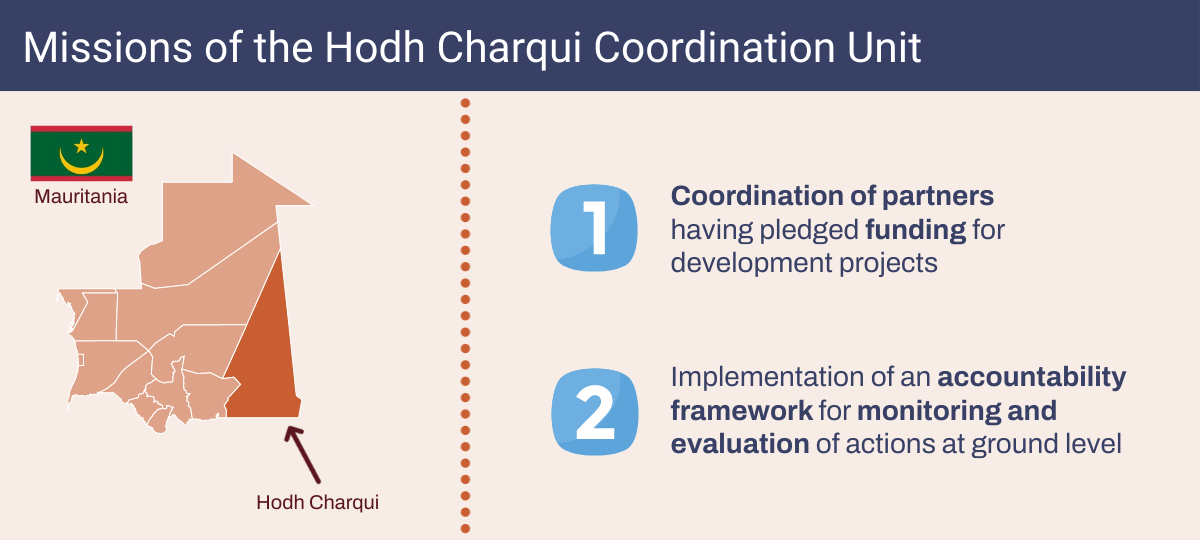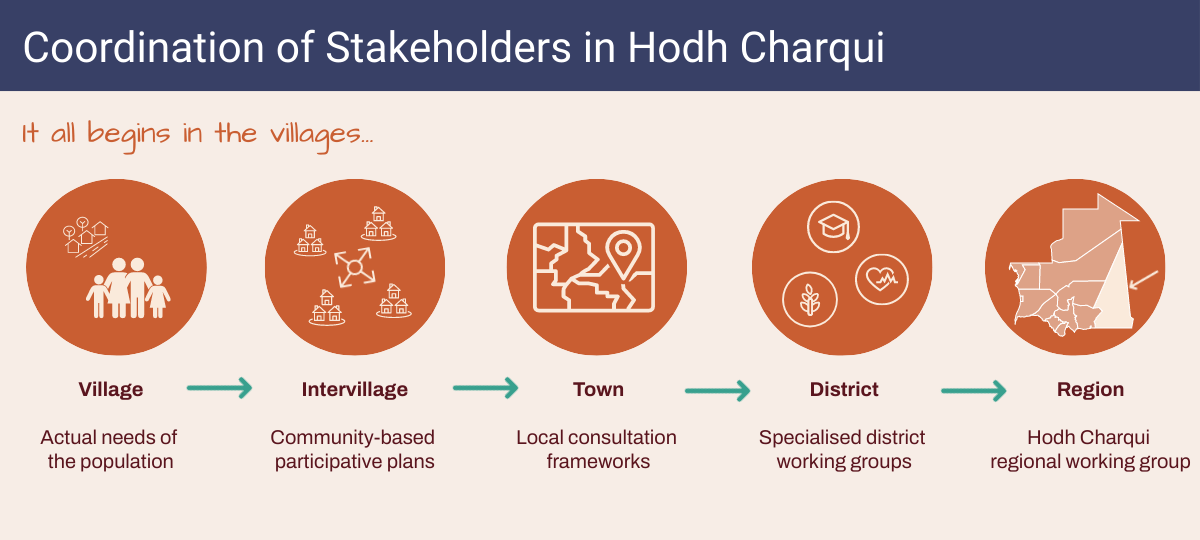Coordination of Development Aid – The Example of Hodh Charqui in Mauritania
The coordination of development stakeholders was strengthened in 2021 in Hodh Charqui, under the leadership of the coordination unit. The impact is tangible for local people, whose real needs are taken into account. To find out more, we met Cheikh Abdallahi Ewah, coordinator of the unit. Priorities include peaceful cohabitation and the development of basic services for host and refugee populations. Interview.
The Development Priorities of the Hodh Charqui Region in Response to Challenges

Cheikh Abdallahi Ewah: “Hodh Charqui is the most densely populated region in Mauritania, after Nouakchott, and the region with the greatest potential in terms of livestock. Nearly half of the 2,400 km border between Mauritania and Mali is located in the Hodh-Charqui region.
The region faces many challenges. The security challenges are extremely important and sensitive. Mauritania has implemented a system that has so far produced very good results.
Our aim is to strengthen the State’s presence in the region, because we believe that areas that are not under our control, that we do not really know, cannot be governed or managed.
One of the main tasks of the coordination unit is to strengthen the State’s presence at ground level and help find solutions for young people. We are doing all we can to work on employability and youth employment in order to offer prospects and opportunities to young people.
We are also working on the empowerment of women, on wealth creation in the region and on territorial equity in the distribution of basic services to the population.”
Origin and Role of the Hodh Charqui Coordination Unit
The Néma Round Table provided the catalyst for coordination in the region, encouraging the implementation of the Integrated Territorial Approach.
“We worked with our partners using the Integrated Territorial Approach, and we began by carrying out a diagnosis of the area. The approach was participative, involving all the local stakeholders, in particular local and town representatives, regional representatives, youth associations, civil society associations, women’s associations…
We developed a strategy that was intended to be a regional version of the national strategy, with a basic diagnosis carried out at ground level.
Following this strategy, we organised a round table in Nema on 28 November 2021, to which we invited all the relevant partners. Our development partners adopted the strategy we presented and committed to funding the project with $118 million. At the end of the round table, the government decided to create a structure dedicated to coordinating all the funding pledges and monitoring the implementation of projects at ground level. As a result, the Hodh Charqui development projects and programmes coordination and monitoring & evaluation unit has been set up.

With the help of the United Nations, we created a stakeholder mapping system, a database showing who is doing what and where. This is an extremely important technical tool for avoiding duplication of actions in the field.
With this tool, we can better identify where there are gaps in terms of education, access to drinking water and sanitation, so that we can direct our actions towards these areas.”
The coordination mechanisms set up by the Hodh Charqui coordination unit are as follows:

“We are satisfied with the work done on the ground and with the willingness of all the partners. Everyone recognised the need to coordinate development actions.
Admittedly, there are still funds to be mobilised, but there is also work to do in terms of monitoring and evaluation of actions, to study what needs to be corrected and to identify where action should be taken according to local needs.
We are also very pleased that Mauritania hosted the 4th General Assembly of the Sahel Alliance last July. For us, it’s a sign of trust with our partners.”
Making the Region Attractive to All: Host Populations and Refugees
“The Hodh Charqui region hosts a very large number of refugees. In the Mbera camp, there are more than 90,000 people. In recent years, more and more refugees have been living outside the camps, particularly in the south of the region.
We are doing everything in our power to ensure that the refugees find peace and safety here. We want them to be protected and to have access to civil status documents as well as biometric documents.
The UNHCR is working with the Population Registration Agency to ensure that all refugees are registered, counted and can obtain their identification cards. This gives them access to basic services and to their rights as refugees in the country, in line with Mauritania’s international commitments.
We are also working to ensure greater cohesion and peaceful cohabitation with the host populations. This region is very poor and the local populations are generally quite deprived. Therefore, it was important to ensure that the little the local people had could be shared with the refugees, in particular water points, pastures, etc.
We are getting the message across to local people that the presence of refugees in their area can be an opportunity in terms of development projects. In fact, development projects will not only operate in the refugee camps, but also outside the camps. Water, education and health projects will also affect local populations. Our aim is to make Hodh Charqui an attractive area in terms of the services it offers to host communities and refugees.
Our aim is to achieve higher rates of access to education and health, and to achieve this, people must have access to as many basic services as possible.
At the moment, we are proud to be one of the only countries in the region where there have never been any conflicts between host populations and refugees. This is the result of the work carried out by Mauritania’s government, and we intend to continue to work towards greater peace, security and development.
This is the most important thing for us: peace, the security of our populations, of the foreigners who live among us, but also the improvement of living conditions for everyone. Our unit works with all governmental, international and non-governmental bodies to achieve these objectives.”
To find out more

